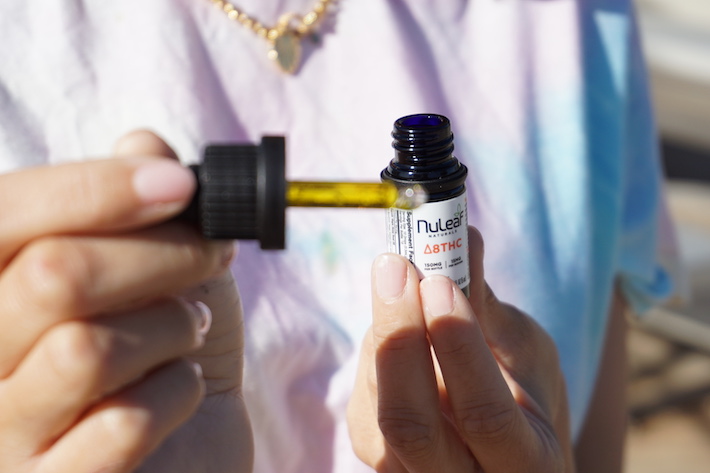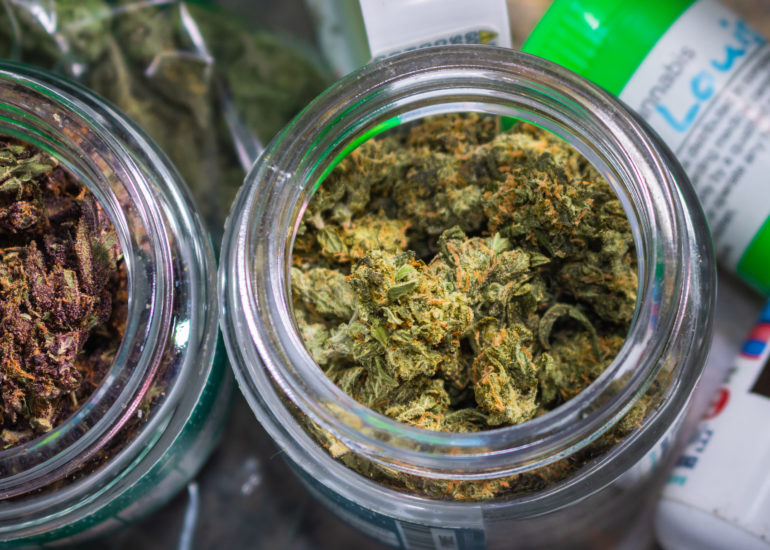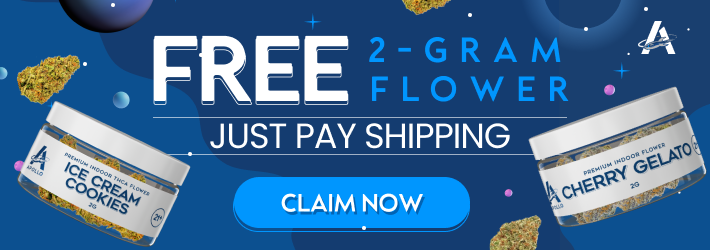Delta-8 THC has been treated a little differently in Utah compared to most states. While other governments basically just accepted the loophole-ish legalization of the substance with the 2018 Farm Bill, Utah’s government limited the types of products allowed and made it so they could only be legally purchased through the medical marijuana system.
However, recent changes have both made other cannabinoid products more easily accessible but have also effectively banned all commercial delta-8 THC products.
Here’s what you need to know about Utah’s new hemp law.
Is Delta-8 THC Legal to Sell in Utah?
Delta-8 THC is not legal to sell in Utah. The state considers “artificially derived cannabinoids” like delta-8 to be adulterants, and as such, they are banned from sale. The only possible exception is in the medical marijuana industry.
Utah passed House Bill (HB) 227 in March 2023, and this made some important changes to state hemp law. Firstly, it created a new category of “artificially derived cannabinoids,” which means a substance “that is created by a chemical reaction that changes the molecular structure of any chemical substances derived from the cannabis plant.” Essentially all delta-8 THC in commercial products is produced this way.
Secondly, it classified artificially derived cannabinoids as “adulterants,” which means they cannot be added to any cannabinoid product in the state. While before this bill, delta-8 THC products were tolerated in the medical cannabis program, this is no longer the case.
Finally, the bill establishes a limit of 5 mg per serving for THC and any THC analogs like delta-8, as well as maintaining the rule that analogs are also included in the 0.3% allowable THC level.
This means that even if a manufacturer were to naturally extract delta-8 from hemp or grow a hemp plant naturally high in the cannabinoid, there would still be substantial limitations on products.
The only way to get delta-8 THC legally in the state would be under the rules for medical marijuana (R68-28-13.(7)), provided it is isolated to 95% purity. However, it’s unclear if any products are available in this way.
RELATED: Where Is Delta-8 THC Legal? A State-by-State Map
Delta-8 THC Legislation Timeline for Utah
Delta-8 THC is technically available through the medical marijuana program in Utah, but from May 2023 it has been effectively outlawed in all hemp products.
Utah’s hemp program was first established through HB 105 in 2014, but in line with the 2014 Farm Bill, this was purely for research purposes. It did make allowances for patients with epilepsy who would benefit from using hemp extract, though, essentially mirroring a medical cannabis program with a sole focus on epilepsy.
In 2019, the state approved Senate Bill (SB) 105, which established a definition for “cannabinoid product” in state law and allowed the sale of cannabinoid products registered with the Department of Agriculture and Food. The main requirements for these products are that they are in “medicinal dosage form” (i.e. tablets, capsules, oils, gelatinous cubes) and contain less than 0.3% THC.
However, at this point, the only exemption to the controlled substances bill (section 58-37-3.6/page 7) is if the product and its sale complied with the Cannabinoid Research and Medical Cannabis act. In short, it was only possible to buy delta-8 THC products as part of the regulated medical cannabis industry.
HB 227 was signed into law in March 2023, and took effect from May 3rd, 2023. This bill classified any artificially-derived cannabinoid as an adulterant, which means they can’t be sold as hemp under any circumstances. At the same time, there is a new exception for other hemp cannabinoid products registered with the Department of Agriculture and Food, which means that they may be sold outside of the medical marijuana program.
On June 30, 2023, the Department of Agriculture and Food issued emergency rules to apply the mandates of HB 227. The emergency rule is effective for 120 days and requires additional information regarding primary cannabinoids on product labels.
Additionally, rule R68-28 became effective at the end of October, and makes it possible to use artificially-derived cannabinoids in a medical cannabis product provided that they are 95% or greater in purity.
Can Delta-8 THC Be Added to Food?
No. Delta-8 THC is considered an adulterant if it was produced by chemically modifying a hemp cannabinoid, which covers essentially all commercial delta-8 products.
Both state and federal law prohibit adding delta-8 THC to foods. While other cannabinoids can be sold in edible form (with many gummies registered in the state, for example), commercial delta-8 THC products are “artificially derived” under Utah law, which prevents them from being sold in any form. Federal law also prohibits adding delta-8 THC to food that will enter interstate commerce.
Can You Buy Delta-8 THC Products in Utah?

Delta-8 THC is illegal in Utah but there are some signs that products may still be available to buy in some places.
Despite the official ban on delta-8 THC products, there are still some delta-8 containing products registered for legal sale with the state (e.g. registration number IHP-PROD-1340 and IHP-PROD-1705 through -1710). It’s unclear how this squares with state law – it could be that the state just hasn’t “cleaned up” its list since the passage of HB 227.
Additionally, some stores still list delta-8 THC products for sale online.
Delta-8 Alternatives You Can Legally Buy in Utah
Hemp delta-9 is legal in Utah, although in reality around 50% of products would be considered artificially derived cannabinoids. Given the rules imposed by HB 227, naturally occurring hemp-derived delta-9 THC is really the only legal alternative.
Are There Age Restrictions on Delta-8 THC Products?
If any delta-8 THC products were to be approved, HB 227 makes it illegal to knowingly sell or give delta-8 THC to anyone aged under 21.
Can You Consume Delta-8 THC in Public in Utah?
No. Delta-8 THC is not legal to use in Utah unless it is registered with the Department of Agriculture and Food, which no products legally can be because they are “adulterated.”
As mentioned earlier, though, some delta-8 THC products appear on the registered product list regardless, and it’s unclear exactly how the state would treat public use of these. By the current law, they shouldn’t appear there, but they still do.
Can You Drive Under the Influence of Delta-8 THC in Utah?
It’s illegal to drive under the influence of delta-8 THC in Utah. State law makes it clear that it’s illegal to drive under the influence of “any drug” that impairs your ability to drive.
Utah DUI Law states that you’re driving under the influence if the person (called the “actor” in the law) “is under the influence of alcohol, any drug, or the combined influence of alcohol and any drug to a degree that renders the actor incapable of safely operating a vehicle.” This covers delta-8 THC as well as marijuana or basically anything that impairs your ability to drive.
For a first offense within 10 years, this is a class B misdemeanor, which carries a punishment of a minimum of two days in jail (or 48 hours of community service), a screening for substance abuse (which could either result in an educational program or substance abuse treatment) and fines of over $700.
Can You Travel to Utah With Delta-8 THC?
You can legally travel to Utah with delta-8 THC products, provided that they contain less than 0.3% total delta-9 THC. It’s a good idea to bring a COA that proves this.
Utah law states that it is illegal to transport into or out of state hemp material that contains 0.3% or more of total THC – i.e. delta-9 THC + (0.877 × THCA). However, this means that delta-8 THC products are legal to transport provided they meet this limit (which most commercial products should). It’s illegal to use or sell any cannabinoid product that is not in Utah’s approved list, but this doesn’t apply to products bought from another state that don’t violate the controlled substances bill in some other way. In turn, there is an exemption under the controlled substances act (section 58-37-3.6(2)/page 7) for any product that complies with the hemp laws discussed above.
With this in mind, it’s possible to legally bring delta-8 THC into Utah if it contains less than 0.3% total THC and it was legally purchased out of state. Bringing the Certificate of Analysis (COA) for the product or products is a good idea so that you can prove that they are compliant.
Closing Thoughts: The Future for Delta-8 in Utah
Since the legislature passed HB 227 in 2023, there are no further changes on the horizon for delta-8 THC in the state. You would expect that they’ll catch the apparently illegal delta-8 products currently registered for sale in the state, but this depends entirely on the competence and motivations of the Department of Agriculture and Food.
The most likely change for delta-8 THC in Utah will come from the federal government, who are due to update the Farm Bill in 2023, and who are expected to modify the definition of “hemp” in a way that rules delta-8 THC out. However, while there are expectations, it’s unclear how exactly things will progress at the federal level.
Editor’s note: We previously stated that traveling to Utah with delta-8 products would be illegal. However, upon further research, it appears this is not the correct interpretation of state laws. We made edits throughout the article to correct this.

